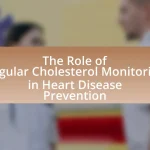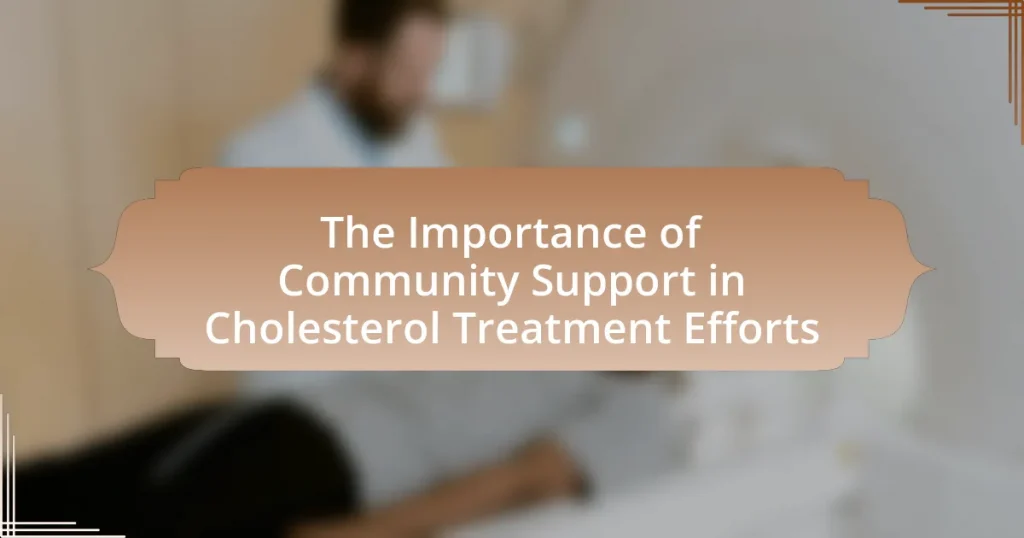The article emphasizes the critical role of community support in cholesterol treatment efforts, highlighting how emotional encouragement, shared knowledge, and resources can enhance adherence to treatment plans. It discusses the positive impact of social networks on individual health outcomes, particularly in managing cholesterol levels through lifestyle changes. The article also explores effective types of community support, such as peer support groups and educational programs, while addressing challenges like socioeconomic barriers and limited access to healthcare. Additionally, it outlines strategies for communities to raise awareness about cholesterol issues and improve health outcomes through collaboration and engagement initiatives.
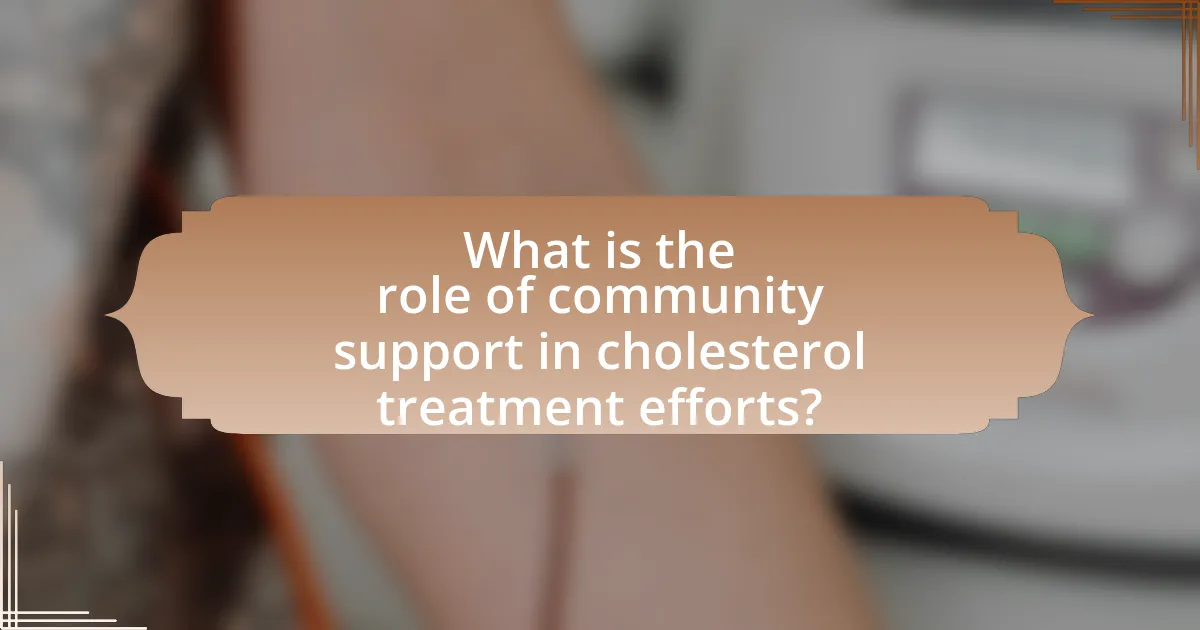
What is the role of community support in cholesterol treatment efforts?
Community support plays a crucial role in cholesterol treatment efforts by providing emotional encouragement, resources, and shared knowledge among individuals managing cholesterol levels. This support can enhance adherence to treatment plans, as studies indicate that social networks positively influence health behaviors; for instance, a study published in the Journal of the American Heart Association found that individuals with strong social support are more likely to maintain healthy lifestyle changes, such as diet and exercise, which are essential for managing cholesterol. Additionally, community programs that promote awareness and education about cholesterol can lead to better health outcomes by fostering a collective commitment to healthier living.
How does community support influence individual health outcomes?
Community support significantly enhances individual health outcomes by providing emotional, informational, and practical assistance. Research indicates that individuals with strong community ties are more likely to engage in healthy behaviors, adhere to treatment plans, and experience improved mental health. For instance, a study published in the American Journal of Public Health found that social support networks can lead to better management of chronic conditions, including cholesterol levels, by encouraging lifestyle changes and facilitating access to healthcare resources. This evidence underscores the critical role that community support plays in promoting overall health and well-being.
What specific types of community support are most effective?
Peer support groups are among the most effective types of community support for cholesterol treatment efforts. These groups provide individuals with shared experiences, fostering a sense of belonging and motivation to adhere to treatment plans. Research indicates that participants in peer support groups report improved health outcomes, including better cholesterol management, due to the encouragement and accountability they receive from fellow members. A study published in the Journal of the American Heart Association found that individuals who engaged in peer support experienced a 10% greater reduction in LDL cholesterol levels compared to those who did not participate in such groups. This evidence underscores the effectiveness of peer support in enhancing cholesterol treatment efforts.
How does social interaction impact cholesterol management?
Social interaction positively impacts cholesterol management by providing emotional support, accountability, and shared knowledge among individuals. Engaging with a community can lead to healthier lifestyle choices, as social networks often encourage physical activity and healthier eating habits. Research indicates that individuals with strong social ties are more likely to adhere to dietary recommendations and exercise regimens, which are crucial for maintaining optimal cholesterol levels. For instance, a study published in the Journal of the American Heart Association found that social support significantly correlates with improved adherence to cholesterol-lowering medications and lifestyle changes, highlighting the role of community in effective cholesterol management.
Why is community engagement crucial for cholesterol awareness?
Community engagement is crucial for cholesterol awareness because it fosters collective understanding and proactive health behaviors among individuals. Engaging communities in cholesterol education initiatives leads to increased knowledge about cholesterol levels, risk factors, and management strategies. For instance, studies show that community-based interventions can reduce cholesterol levels by up to 10% in populations through shared resources and support systems. This collaborative approach not only enhances individual awareness but also promotes a culture of health, encouraging regular screenings and lifestyle changes that can significantly lower cardiovascular disease risks.
What are the benefits of community-led cholesterol education programs?
Community-led cholesterol education programs improve public health by increasing awareness and understanding of cholesterol management. These programs empower individuals with knowledge about dietary choices, physical activity, and lifestyle changes that can lower cholesterol levels. Research indicates that community engagement in health education leads to better health outcomes; for instance, a study published in the Journal of Community Health found that participants in community-led programs showed a significant reduction in LDL cholesterol levels compared to those who did not participate. Additionally, these programs foster social support networks, which can enhance motivation and adherence to healthy behaviors, ultimately contributing to lower rates of cardiovascular diseases in the community.
How can communities raise awareness about cholesterol issues?
Communities can raise awareness about cholesterol issues through educational programs, health fairs, and social media campaigns. Educational programs can provide information on cholesterol’s impact on health, dietary choices, and lifestyle changes that can help manage cholesterol levels. Health fairs can offer free cholesterol screenings and consultations with healthcare professionals, allowing community members to understand their cholesterol levels and the associated risks. Social media campaigns can disseminate information quickly and engage a wider audience, utilizing statistics such as the fact that nearly 95 million adults in the U.S. have high cholesterol, according to the Centers for Disease Control and Prevention. These strategies collectively enhance community knowledge and encourage proactive health management regarding cholesterol.
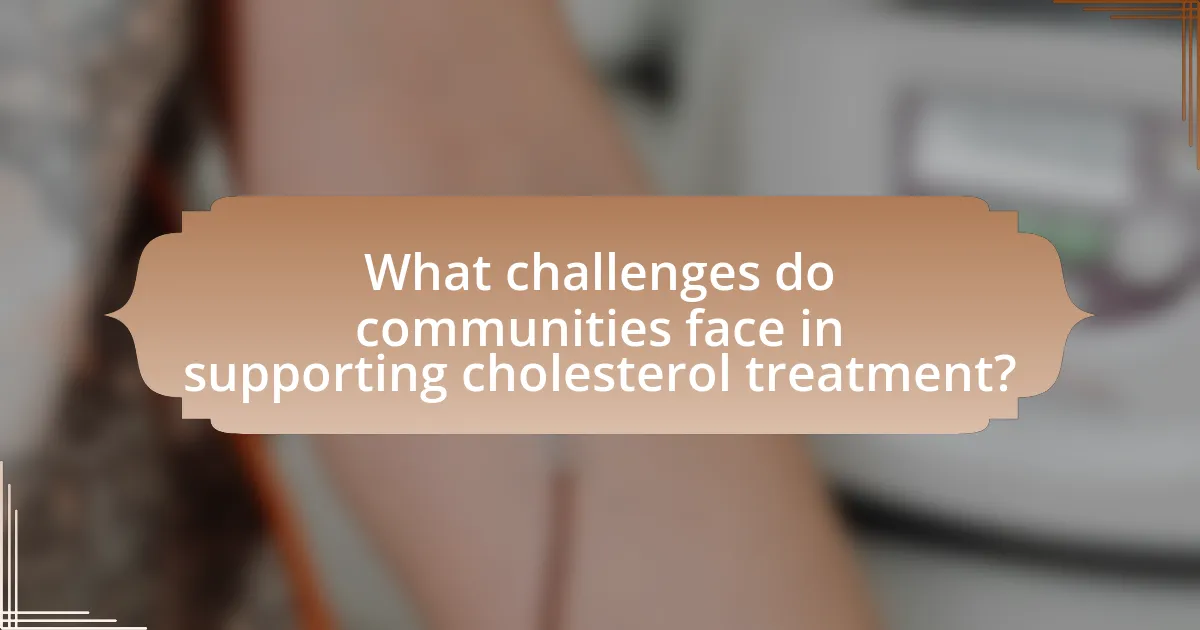
What challenges do communities face in supporting cholesterol treatment?
Communities face several challenges in supporting cholesterol treatment, including lack of awareness, limited access to healthcare resources, and socioeconomic barriers. Lack of awareness about cholesterol management can lead to insufficient community engagement in preventive measures and treatment adherence. Limited access to healthcare resources, such as clinics and specialists, restricts individuals from receiving necessary cholesterol screenings and treatments. Socioeconomic barriers, including financial constraints and lack of insurance, further hinder individuals from accessing medications and lifestyle interventions essential for effective cholesterol management. These challenges collectively impact the overall effectiveness of community support in cholesterol treatment efforts.
How can socioeconomic factors affect community support for cholesterol management?
Socioeconomic factors significantly influence community support for cholesterol management by affecting access to healthcare resources and education. Communities with higher socioeconomic status typically have better access to healthcare services, including cholesterol screening and management programs, which fosters a supportive environment for individuals to engage in cholesterol management. Conversely, lower socioeconomic communities often face barriers such as limited access to healthcare, lack of health education, and financial constraints, which can diminish community support for cholesterol management initiatives. For instance, a study published in the American Journal of Public Health found that individuals in lower-income neighborhoods had higher rates of untreated high cholesterol due to limited access to preventive healthcare services. This disparity highlights how socioeconomic factors directly impact the level of community support available for effective cholesterol management.
What role does access to healthcare play in community support?
Access to healthcare is crucial for community support as it enables individuals to receive necessary medical services, fostering overall health and well-being. When community members have reliable access to healthcare, they are more likely to engage in preventive measures, manage chronic conditions effectively, and seek timely treatment, which collectively enhances community health outcomes. Studies indicate that communities with better healthcare access experience lower rates of morbidity and mortality, demonstrating the direct correlation between healthcare availability and community resilience. For instance, a report from the World Health Organization highlights that improved access to healthcare services leads to increased health literacy and stronger social networks, which are essential for effective community support systems.
How can communities overcome barriers to effective cholesterol treatment?
Communities can overcome barriers to effective cholesterol treatment by implementing educational programs that raise awareness about cholesterol management and promoting access to healthcare resources. These initiatives can include workshops, health fairs, and partnerships with local healthcare providers to facilitate screenings and consultations. Research indicates that community-based interventions, such as the “Community Health Worker Model,” have successfully improved health outcomes by providing tailored support and education, leading to better adherence to treatment plans and lifestyle changes. By fostering a supportive environment and ensuring that individuals have access to necessary resources, communities can significantly enhance the effectiveness of cholesterol treatment efforts.
What strategies can enhance community support for cholesterol treatment?
To enhance community support for cholesterol treatment, strategies should include educational initiatives, community engagement programs, and partnerships with healthcare providers. Educational initiatives, such as workshops and seminars, can inform community members about the risks of high cholesterol and the importance of treatment, leading to increased awareness and proactive health behaviors. Community engagement programs, like support groups and health fairs, foster a sense of belonging and shared responsibility, encouraging individuals to seek treatment and support one another. Collaborating with healthcare providers ensures access to resources, screenings, and professional guidance, which can significantly improve treatment adherence and outcomes. These strategies collectively create a supportive environment that empowers individuals to manage their cholesterol effectively.
How can local organizations collaborate to improve cholesterol health?
Local organizations can collaborate to improve cholesterol health by forming partnerships to provide educational programs, health screenings, and community resources. These collaborations can include local health departments, non-profits, and fitness centers working together to host workshops that educate the community about cholesterol management, dietary changes, and the importance of regular health check-ups. For instance, a study published in the Journal of Community Health found that community-based interventions significantly reduced cholesterol levels among participants by 10% when organizations worked together to implement lifestyle changes and provide support. This evidence demonstrates that coordinated efforts can lead to measurable improvements in cholesterol health within the community.
What role do health professionals play in fostering community support?
Health professionals play a crucial role in fostering community support by educating individuals about cholesterol management and promoting healthy lifestyle choices. They facilitate community programs that provide resources, such as workshops and support groups, which encourage individuals to engage in discussions about cholesterol and heart health. Research indicates that community-based interventions led by health professionals can significantly improve health outcomes; for instance, a study published in the Journal of the American Heart Association found that community health initiatives reduced cholesterol levels by an average of 10% among participants. By building trust and rapport within the community, health professionals empower individuals to seek help and support each other in managing their cholesterol effectively.
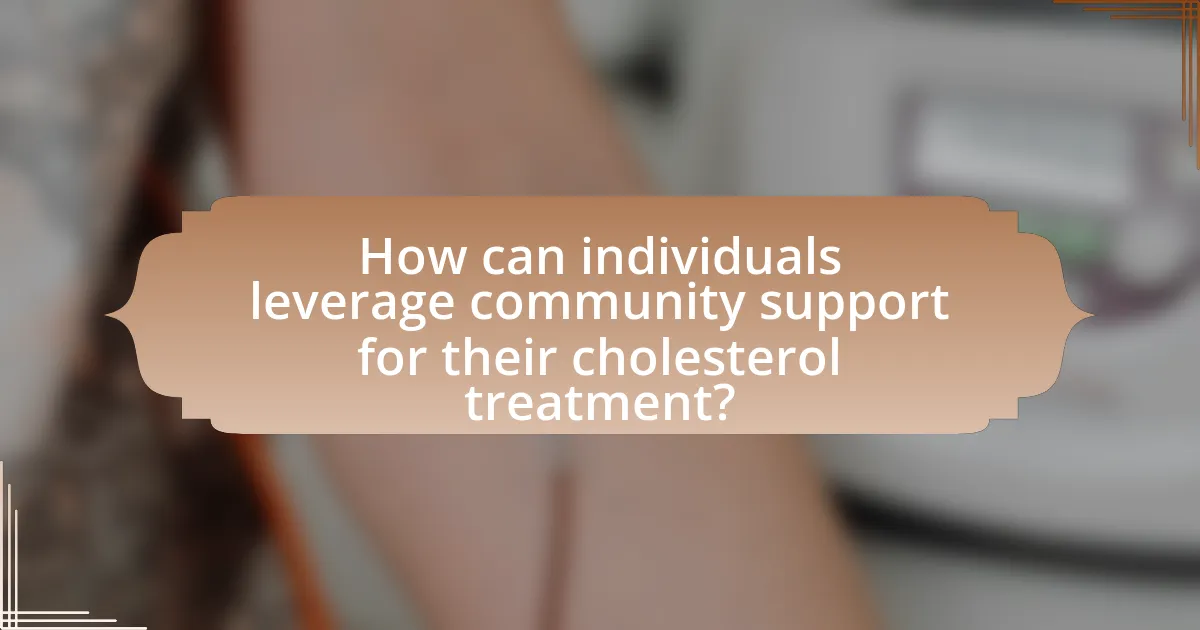
How can individuals leverage community support for their cholesterol treatment?
Individuals can leverage community support for their cholesterol treatment by participating in local health initiatives, support groups, and educational workshops focused on heart health. Engaging with community resources such as these provides access to shared experiences, nutritional advice, and motivation from peers who are also managing cholesterol levels. Research indicates that social support can enhance adherence to treatment plans and improve health outcomes, as seen in a study published in the Journal of the American Heart Association, which found that individuals with strong social networks are more likely to maintain healthy lifestyle changes.
What resources are available within communities for cholesterol management?
Communities offer various resources for cholesterol management, including health education programs, support groups, and access to healthcare professionals. Health education programs often provide workshops and seminars focused on nutrition, exercise, and lifestyle changes that can help lower cholesterol levels. Support groups facilitate peer interaction, allowing individuals to share experiences and strategies for managing cholesterol effectively. Additionally, local healthcare providers, such as dietitians and physicians, can offer personalized advice and treatment plans tailored to individual needs. These resources collectively enhance community members’ ability to manage cholesterol and improve overall heart health.
How can individuals find support groups focused on cholesterol issues?
Individuals can find support groups focused on cholesterol issues by searching online platforms such as Facebook, Meetup, or health-related websites like the American Heart Association. These platforms often host groups specifically for individuals managing cholesterol levels, providing a space for sharing experiences and advice. Additionally, local hospitals and clinics frequently offer support groups or can refer individuals to existing ones, ensuring access to community resources tailored to cholesterol management.
What are the benefits of participating in community health initiatives?
Participating in community health initiatives offers numerous benefits, including improved health outcomes, enhanced social connections, and increased awareness of health issues. Engaging in these initiatives can lead to better management of chronic conditions, such as high cholesterol, as community support fosters shared knowledge and resources. Research indicates that communities with active health initiatives experience a 25% reduction in hospitalizations related to chronic diseases, demonstrating the effectiveness of collective efforts in promoting health. Additionally, participation strengthens social ties, which are crucial for mental well-being and can motivate individuals to adopt healthier lifestyles.
What practical steps can individuals take to engage with their community for cholesterol support?
Individuals can engage with their community for cholesterol support by organizing or participating in local health workshops focused on cholesterol education and management. These workshops can provide valuable information on diet, exercise, and lifestyle changes that help lower cholesterol levels. Additionally, individuals can collaborate with local healthcare providers to host cholesterol screening events, which can raise awareness and encourage community members to monitor their cholesterol levels regularly.
Research indicates that community-based interventions can significantly improve health outcomes; for instance, a study published in the American Journal of Public Health found that community engagement in health initiatives leads to increased participation in preventive health measures. By fostering a supportive environment, individuals can help create a culture of health that prioritizes cholesterol management and overall well-being.
How can individuals advocate for better cholesterol health resources in their community?
Individuals can advocate for better cholesterol health resources in their community by organizing awareness campaigns and collaborating with local health organizations. These actions can include hosting educational workshops that inform residents about cholesterol management, promoting healthy lifestyle choices, and providing access to screenings. Research indicates that community-based interventions can significantly improve health outcomes; for instance, a study published in the American Journal of Public Health found that community health initiatives led to a 20% increase in cholesterol screening rates. By mobilizing community members and leveraging local resources, individuals can effectively enhance the availability and quality of cholesterol health resources.
What are effective ways to share personal cholesterol management experiences with others?
Effective ways to share personal cholesterol management experiences with others include participating in support groups, utilizing social media platforms, and engaging in community health events. Support groups provide a structured environment for individuals to discuss their experiences and learn from one another, fostering a sense of community. Social media platforms allow for broader outreach, enabling individuals to share their stories, tips, and successes with a wider audience, which can inspire and motivate others facing similar challenges. Community health events, such as workshops or seminars, offer opportunities for face-to-face interaction, where individuals can share their experiences and learn from healthcare professionals, reinforcing the importance of community support in managing cholesterol levels.



